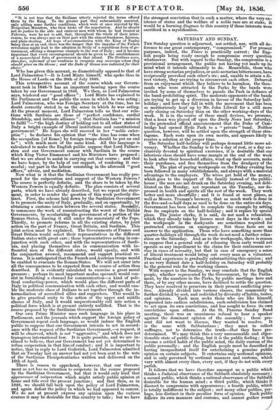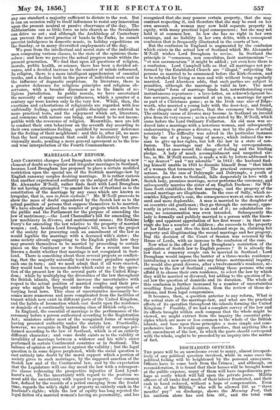SATURDAY AND SUNDAY.
Ting Sunday question is adjourned, not settled, nor, with all de- ference to our great contemporary, "compromised." For present purposes, indeed, the Times is practically correct ; the Eng- lish people being ready enough to compromise every question whatsoever. But with regard to the Sunday, the compromise is a provisional arrangement, the public not having yet made-up its mind what it intends ultimately to do. Meanwhile, those who have strong sectarian prejudices, or anti-sectarian bitternesses, have reciprocally provoked each other's ire ; and, unable to attain a di- rect victory, they are trying to circumvent each other. Debarred from an enjoyment which they believe to be harmless, the thou- sands who were attracted to the Parks by the bands were invited by some of themselves to parade the Park in defiance of the band-prohibiting spirit. The moderate opponents of the bands are trying to get up a diversion in favour of the Saturday half- holiday ; and here they fall in with the movement that has been so meritoriously kept up by Mr. John Lilwall for a still more early closing on Saturday than on the other working-days of the week. It is in the course of these small devices, we presume, that a hoax was played off upon the Daily News last Saturday, in the pretended official announcement that the Duke of Cam- bridge had opened Hyde Park to a " private " band. Neither question, however, will be settled upon the strength of these stra- tagems. Each rests upon its own merits, and appears likely to receive a solution at the proper time.
The Saturday half-holiday will perhaps demand little more ad- vocacy. Whether the Sunday is to be a day of rest, or a day ex- clusively devoted to spiritual exercises, it is desirable that our laborious class should have some margin at the end of the week to look after their household affairs, wind up their accounts, make their purchases, and free themselves from the drudgery of the week. The plan of paying workpeople on the Friday evening has been followed in many establishments, and always with a material advantage to the employers. The wives get hold of the money, which goes to the support of the family instead of the public- house ; the men are not drunk on the Saturday evening, not debi- litated on the Monday, not repentant on the Tuesday, nor de- pressed in health and spirits all the rest of the week. They work better and more cheerfully ; and it is found at most places, as well as Messrs. Truman's brewery, that as much work is done in the five-and-a-half days as used to be done on the entire six days. Government has been asked to complete the example by se
free its employes on the half-holiday ; and it replies by special pleas. Thejunior clerks, it is said, do not need a relaxation, which they already take b'y licence most days in the week ; and the workpeople in the doekyards are sometimes required for protracted exertions on emergency. But these facts are no answer to the application. Those who have something more than quarter-holidays all through the week do not need a further relax- ation on the Saturday. And as to the workpeople, there is reason to suppose that a general rule of releasing them early would not operate as any impediment to the claim for their continuous ser- vice in cases of necessity, but that in case of emergency a sense of liberal treatment would bring out every man as a volunteer. Practical experience is gradually substantiating this opinion ; and at no very distant date a half-holiday on Saturday will probably be the general rule for the working classes. With respect to the Sunday, we may conclude that the English people, whether represented by the Government, by the Parlia- ment, by the numbers in the Parks, by public meetings here and there, or by any other means, have declined to settle the question. They have resolved to persevere in their present conflicting prac- tice. Already divided into various classes, the community is further divided by sect, and redivided by diversity of habits, tastes, and opinions. Each man seeks those who are like himself. Separated into endless subdivisions, each subdivision has claimed to act upon its own convictions, and has sought to force its own convictions upon others. At the St. Pancras Sunday Band meeting, there was an 'unanimous refusal to hear a speaker against the dominant opinion of the assembly ; those pre- sent did not want to discuss, they wanted to resolve. It is the same with Sabbatariansthey meet to collect suffrages, not to determine the truth—that they have pre- determined. We may think this a very unreasonable and objec- tionable state of public feeling, but it as the public feeling ; it has become a settled habit of the public mind, the daily custom of the public personally ; and the English people must be described as having incapacitated itself for entertaining a genuine .public opinion on certain subjects. It entertains only sectional opinions, and is only governed by sectional manners and customs, which vary with almost every class, every sect, if they do not with every parish. It follows that we have therefore amongst us a public which thinks a Judaical observance of the Sabbath absolutely necessary ; a second public, which thinks a rational observance of the Sabbath desirable for the human mind ; a third public, which thinks it discreet to compromise with appearances ; a fourth public, which is totally indifferent to the subject ; and many. other publics, per- haps, less distinct in their peculiar form of opinion. Each public follows its own manners and customs, and cannot gather round any one standard a majority sufficient to dictate to the rest. But it can on occasion rally to itself influences to resist any innovation upon the present neutral or passive observance of the day. The Sabbatarians can as little force us into church as the Secularists can drive us out ; and although the Archbishop of Canterbury can prevent the novel practice of bands in the Parks, he cannot prevent indulgence in domestic music, in holiday expeditions on the Sunday, or in many diversified employments of the day.
We pass from the intellectual and moral state of the individual men composing various classes, to the state of the opinions them- selves ; and here we perceive the actual progress made within the present generation. We find that upon all questions of religion, morals, public health, or science, there has been a decided ad- vance, and a decided increase in the number of minds influenced. In religion, there is a more intelligent apprehension of essential truths, and a decline both in the power of individual sects and in the influence of dogmatic scepticism. In literature, there is a greater deference for religious principles and religious ob- servance, with a broader discussion as to the limits of re- ligious jurisdiction. In public morals, we have ascertained the necessity of many sanitary influences, which a quarter of a century ago were known only to the very few. While, then, the exertions and exhortations of religionists are regarded with less unfriendly feeling, questions of public discipline are referred to more practical tests, and the enjoyment which art, literature, and commune with nature can bring, are found to be not incom- patible with the reverence of religion. Meanwhile, men are left to conduct their own behaviour on the seventh day according to their own conscientious feeling, qualified by necessary deference for the feeling of their neighbours : and this is, after all, no more than the best arrangement that could be deliberately but pro- visionally made, pending a more general agreement as to the true and wise interpretation of the Fourth Commandment.



































 Previous page
Previous page